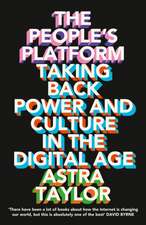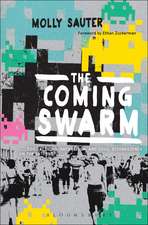Media Psychology 101
Autor Christopher J. Fergusonen Limba Engleză Paperback – 13 sep 2015
There are few areas of modern social science that are as fiercely debated as media psychology. Written by one of the foremost experts on the topic, this is a concise overview of what is knownoand not knownoabout how individuals are affected by and interact with various forms of mass media. The book critically examines research from cognitive, social, developmental, biological, and evolutionary approaches to psychology and addresses the interplay between media consumption and viewer behavior in such realms as advertising, body image, sex, and violence. Distinguished by its examination of research from a scientifically objective position, the book offers students not only current knowledge of media psychology but also the tools to challenge commonly held assumptions from popular advocacy and ideology.
This text cuts across different psychological approaches to studying how individuals are affected by mass media and includes research from criminal justice and sociology. It considers critical debates in media psychology and how debates in science themselves can be influenced by processes such as "moral panic." Written in a lively, accessible manner, the book draws upon engaging examples such as Photoshopped model controversies, dubious advertising practices, and attempts to blame violent crimes on media to illustrate scholarly principles. Throughout, data from research studies are related back to real-world phenomena such as violence rates, advertising dollars spent, or changes in the news media. Written for upper-level undergraduate and graduate students studying media psychology, the text will also be of value to professionals in psychology, sociology, and criminal justice as well as individuals involved in public policy as it relates to media effects.
Key Features Offers an objective, interdisciplinary approach to understanding media and behavior Draws from cognitive, social, developmental, and biological psychology, as well as criminal justice research and sociology Challenges the conclusions drawn from research to foster critical thinking Written in a lively, accessible writing style with engaging examples "
Preț: 256.14 lei
Nou
49.01€ • 51.31$ • 40.55£
Carte tipărită la comandă
Livrare economică 07-21 aprilie
Specificații
ISBN-10: 082619673X
Pagini: 288
Dimensiuni: 130 x 203 x 15 mm
Greutate: 0.27 kg
Editura: Springer
Descriere
There are few areas of modern social science that are as fiercely debated as media psychology. Written by one of the foremost experts on the topic, this is a concise overview of what is knownoand not knownoabout how individuals are affected by and interact with various forms of mass media. The book critically examines research from cognitive, social, developmental, biological, and evolutionary approaches to psychology and addresses the interplay between media consumption and viewer behavior in such realms as advertising, body image, sex, and violence. Distinguished by its examination of research from a scientifically objective position, the book offers students not only current knowledge of media psychology but also the tools to challenge commonly held assumptions from popular advocacy and ideology.
This text cuts across different psychological approaches to studying how individuals are affected by mass media and includes research from criminal justice and sociology. It considers critical debates in media psychology and how debates in science themselves can be influenced by processes such as "moral panic." Written in a lively, accessible manner, the book draws upon engaging examples such as Photoshopped model controversies, dubious advertising practices, and attempts to blame violent crimes on media to illustrate scholarly principles. Throughout, data from research studies are related back to real-world phenomena such as violence rates, advertising dollars spent, or changes in the news media. Written for upper-level undergraduate and graduate students studying media psychology, the text will also be of value to professionals in psychology, sociology, and criminal justice as well as individuals involved in public policy as it relates to media effects.
Key Features Offers an objective, interdisciplinary approach to understanding media and behavior Draws from cognitive, social, developmental, and biological psychology, as well as criminal justice research and sociology Challenges the conclusions drawn from research to foster critical thinking Written in a lively, accessible writing style with engaging examples "



















